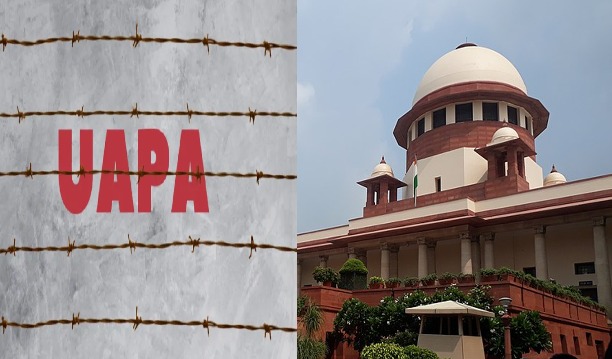
The Supreme Court held on Friday that participation in a group designated illegal by the Central Government is sufficient to establish an offense under the Unlawful Activities Prevention Act (UAPA).
A bench comprised of Justice MR Shah, Justice CT Ravikumar and Justice Sanjay Karol maintained the constitutionality of Section 10(a)(i) of the UAPA, which had previously been invalidated by a division bench of the Court in 2011.
“The aim of UAPA is to prevent certain unlawful activities and prevent the same…at the cost of repetition, UAPA is to punish the person a member of an unlawful organization in furtherance of the provisions of the UAPA…Thus Section 10(a)(i) is absolutely in accordance with Articles 19(1)(a) and 19(2) of the Constitution and thus in accordance with the objectives of the UAPA,” the bench held.
Another issue before the bench was whether sections of a Central Legislation may be read down in a case where the same was not challenged and without the Central Government being heard.
The bench stated, “Enormous harm would be caused to the State if they are not heard…and Centre should have made submissions to justify 10(1)(i) and what were the objects and purposes…in light of the foregoing, Section 10(a)(i) should not have been read down by this Court, especially when the constitutional validity of the Section was not in question.”
The Bench also took note of the top court’s reliance on United States court judgements in its 2011 decisions that read down the clause. It stated, ” “In the Arup Bhuyan and Raneef instances, his Court alluded to US cases without referring to Indian cases and discrepancies… As a result, this Court adopted US judgements with which we disagree. We do not claim for a second that decisions of the United States Supreme Court will not direct us… Nonetheless, Indian courts must recognize the differences in the character of the two countries’ laws.”
In 2011, a Bench of Justice Markandey Katju and Justice Gyan Sudha Mishra had acquitted one Arup Bhuyan, and shortly after, one Indra Das, for offences under the Terrorist and Disruptive Activities (Prevention) Act (TADA).
The Supreme Court ruled that the TADA court relied on an alleged confession statement, and that mere membership in a prohibited organization under the Act could not be used to condemn someone.
In the context of the TADA Act, the 2011 Bench observed, relying on its decision in State of Kerala v. Raneef as well as the American Bill of Rights and some US Supreme Court rulings, that, “In our opinion, Section 3(5) cannot be read literally otherwise it will violate Articles 19 and 21 of the Constitution…Hence, mere membership of a banned organisation will not make a person a criminal unless he resorts to violence or incites people to violence or creates public disorder by violence or incitement to violence.”
The Supreme Court stated in 2014 that the major issue in three cases should be addressed by a larger bench. This resulted in the current reference.
The Union government and certain state governments complained that the aforementioned proviso was effectively read down by relying on the American Bill of Rights, impeding the fight against terrorism because the top court’s interpretation impacted UAPA cases as well.
The Central Government contended that the Court could not read down the terms of an anti-terror act without first hearing its views and relying on suspected law-abuse.
Appearing for the Central government, Solicitor General Tushar Mehta argued that official membership of banned organisations was anyways difficult to prove.
The provisos read down were a deterrent and preventive measure, he added.
The SG had emphasized that the existing system might allow terrorist activities if it is not carried out under the banner of banned/terrorist organizations.
Appearing for an intervenor-NGO, Senior Advocate Sanjay Parikh argued that in matters involving susbtantive rights like personal liberty, provisos could be read down even when not under direct challenge.
He argued that because civil freedoms are enshrined in both the Indian and American constitutions, it would be improper to invalidate the orders under appeal only on the basis of US court decisions.




